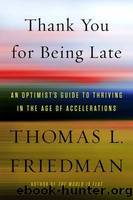Thank You for Being Late: An Optimist's Guide to Thriving in the Age of Accelerations by Friedman Thomas L

Author:Friedman, Thomas L. [Friedman, Thomas L.]
Language: eng
Format: epub
Tags: Business, Politics, Self Help, History, Science, Psychology
Goodreads: 26114127
Publisher: Farrar, Straus and Giroux
Published: 2016-08-23T07:00:00+00:00
TEN
Mother Nature as Political Mentor
Charles Darwin is often quoted as saying that it is not the strongest species that survives but the most adaptable. But according to QuoteInvestigator.com (QI), he did not write that in his classic On the Origin of Speciesâand thereâs no evidence that he even said it somewhere else. QIâs research suggested that the quote emerged over time from a speech delivered by a Louisiana State University business professor, Leon C. Megginson, at the convention of the Southwestern Social Science Association in 1963.
Megginson reportedly said:
Yes, change is the basic law of nature. But the changes wrought by the passage of time affect individuals and institutions in different ways. According to Darwinâs Origin of Species, it is not the most intellectual of the species that survives; it is not the strongest that survives; but the species that survives is the one that is able best to adapt and adjust to the changing environment in which it finds itself. Applying this theoretical concept to us as individuals, we can state that the civilization that is able to survive is the one that is able to adapt to the changing physical, social, political, moral, and spiritual environment in which it finds itself.
Thank you, Professor Megginson!
That is so well saidâwhether Darwin said any of it or not. To paraphrase, itâs not the strongest quote that survives, itâs the most adaptable! And this one is so relevant for our times. In the first decade and a half of the twenty-first century, we went through a major technological inflection pointâconnectivity became fast, free, easy for you, and ubiquitous, while complexity became fast, free, easy for you, and invisible. And this has unleashed flows of energy that, in combination with climate change, have, as weâve already explored, reshaped the workplace and geopolitics and prompted us to reimagine how we approach both. But that reimagining cannot succeed in isolation. It also requires us to reimagine our domestic politicsâboth in order to deliver the kinds of specific policy fixes we need in the workplace and in geopolitics, and also more generally to create a society with the kind of resilience weâll need to thrive when the Market, Mother Nature, and Mooreâs law are all accelerating. This is going to require some very different approaches to politics generally, and that political realignment appears to already be under way.
In the previous chapter I argued that in the age of accelerations some weak states would explode. What seems to be happening to strong states is that their politics implodesâthat is, their borders hold but their political parties begin to crack up, because in their present forms they cannot adequately and coherently respond to the simultaneous and interrelated changes in technology, globalization, and the environment. In America and Europe, the major political parties have been locked in backward-looking agendas developed in response to the Industrial Revolution, the New Deal, the Cold War, civil rights movements, and the early information technology revolution. Their current coalitions and internal compromises may not be able to deal with the age of accelerations.
Download
This site does not store any files on its server. We only index and link to content provided by other sites. Please contact the content providers to delete copyright contents if any and email us, we'll remove relevant links or contents immediately.
The Secret History by Donna Tartt(19088)
The Social Justice Warrior Handbook by Lisa De Pasquale(12190)
Thirteen Reasons Why by Jay Asher(8910)
This Is How You Lose Her by Junot Diaz(6887)
Weapons of Math Destruction by Cathy O'Neil(6280)
Zero to One by Peter Thiel(5802)
Beartown by Fredrik Backman(5754)
The Myth of the Strong Leader by Archie Brown(5507)
The Fire Next Time by James Baldwin(5446)
How Democracies Die by Steven Levitsky & Daniel Ziblatt(5219)
Promise Me, Dad by Joe Biden(5153)
Stone's Rules by Roger Stone(5088)
A Higher Loyalty: Truth, Lies, and Leadership by James Comey(4964)
100 Deadly Skills by Clint Emerson(4925)
Rise and Kill First by Ronen Bergman(4789)
Secrecy World by Jake Bernstein(4753)
The David Icke Guide to the Global Conspiracy (and how to end it) by David Icke(4720)
The Farm by Tom Rob Smith(4513)
The Doomsday Machine by Daniel Ellsberg(4490)
